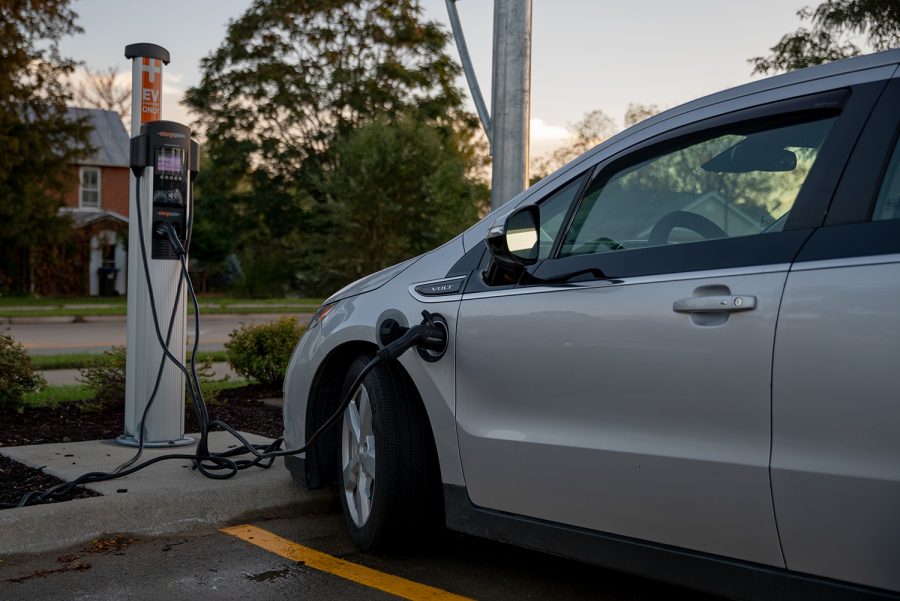Johnson County adding electric vehicle charge points
Iowa City has almost reached its goal of charge points outlined in the Eastern Iowa Electric Vehicle Readiness Plan. The plan consists of increasing electric vehicle infrastructure to accommodate rising adoption rates in the city.
A Chevy Volt is shown being charged at a HyVee parking lot in Iowa City on Wednesday, Oct. 13, 2021
October 14, 2021
Iowa City is nearing its goal of electric vehicle charge points in the Eastern Iowa Electric Vehicle Readiness Plan.
The Eastern Iowa Electric Vehicle Readiness Plan, finalized in June 2021, states that the areas with the most electric vehicle adoption rates were areas that had at least 450 public charge points per million population.
According to the Alternative Fuels Data Center, Iowa City currently has 386 charge points per million population. Climate Action Engagement Specialist Sarah Gardner said the city is working towards the 450 charge points per million population needed to support the adoption rate of electric vehicles in Iowa City.
According to the Department of Transportation’s reports, Johnson County’s number of registered electric vehicles increased from 587 vehicles in 2020 to 692 in 2021.
“The data is pretty clear that EV adoption is accelerating, and I think accelerating in a way that, even five years ago, people might not have anticipated,” Gardner said.
The Electric Vehicle Readiness Plan was created as a collaboration between Iowa City, Cedar Rapids, Dubuque, Davenport, Waterloo, and Cedar Falls. The purpose of the plan was to create a guide for each city to expand electric vehicle infrastructure like charging stations, Gardner said.
“We recognize that when people have vehicles, they don’t want to just drive around the city they live in, they want to be able to go to other places,” Gardner said. “We wanted to make sure that someone who owns an electric vehicle in this area can travel with confidence throughout our region.”
Electric vehicle adoption rates aren’t just rising in eastern Iowa, they are increasing throughout the state, MK Anderson, clean cities coordinator for Iowa Clean Cities Coalition, said.
“When I started this position in 2018, there was only one DC fast charger in Iowa, and now there are 40 in operation,” Anderson said.
Increasing electric car adoption rates is not the only reason why cities should begin expanding their vehicle infrastructure, Anderson said.
“Every major automaker has announced that they will only be producing EVs within the next decade or so,” she said. “We are going to need to be able to fuel these vehicles.”
Funding for the expansion of electric vehicle infrastructure, like charging stations, falls to each city, Gardner said. For example, in Iowa City charging stations in public parking garages is being funded by parking revenue, she said.
RELATED: New electric-vehicle charging stations open in Iowa City’s Court Street Transportation Center
There are options for funding at the state level, Anderson said. One way to fund these projects is by applying for a zero-interest loan at the Iowa Energy Office, which finances alternative fuel infrastructure projects, she said.
President Joe Biden’s infrastructure bill, if passed, will also provide specific funding to each state for the purpose of expanding electric vehicle infrastructures, Anderson added.
“It would provide, honestly, just unprecedented funding opportunities for alternative fuel vehicles and electric vehicle deployment and infrastructure development,” Anderson said.



